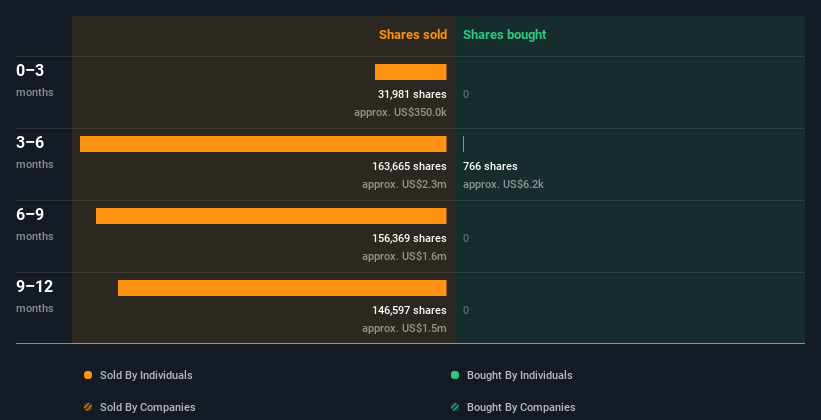Stock Analysis
- United States
- /
- Consumer Services
- /
- NasdaqGS:UDMY
Udemy Insiders Sold US$5.8m Of Shares Suggesting Hesitancy

Quite a few Udemy, Inc. (NASDAQ:UDMY) insiders sold their shares over the past year, which may be a cause for concern. When evaluating insider transactions, knowing whether insiders are buying versus if they selling is usually more beneficial, as the latter can be open to many interpretations. However, when multiple insiders sell stock over a specific duration, shareholders should take notice as that could possibly be a red flag.
While we would never suggest that investors should base their decisions solely on what the directors of a company have been doing, logic dictates you should pay some attention to whether insiders are buying or selling shares.
View our latest analysis for Udemy
Udemy Insider Transactions Over The Last Year
The Chief Financial Officer, Sarah Blanchard, made the biggest insider sale in the last 12 months. That single transaction was for US$499k worth of shares at a price of US$13.74 each. We generally don't like to see insider selling, but the lower the sale price, the more it concerns us. The silver lining is that this sell-down took place above the latest price (US$10.70). So it may not shed much light on insider confidence at current levels.
Over the last year we saw more insider selling of Udemy shares, than buying. You can see the insider transactions (by companies and individuals) over the last year depicted in the chart below. By clicking on the graph below, you can see the precise details of each insider transaction!

If you are like me, then you will not want to miss this free list of growing companies that insiders are buying.
Insiders At Udemy Have Sold Stock Recently
The last quarter saw substantial insider selling of Udemy shares. Specifically, insiders ditched US$515k worth of shares in that time, and we didn't record any purchases whatsoever. This may suggest that some insiders think that the shares are not cheap.
Does Udemy Boast High Insider Ownership?
Many investors like to check how much of a company is owned by insiders. Usually, the higher the insider ownership, the more likely it is that insiders will be incentivised to build the company for the long term. It appears that Udemy insiders own 2.6% of the company, worth about US$43m. We've certainly seen higher levels of insider ownership elsewhere, but these holdings are enough to suggest alignment between insiders and the other shareholders.
So What Does This Data Suggest About Udemy Insiders?
Insiders sold stock recently, but they haven't been buying. And our longer term analysis of insider transactions didn't bring confidence, either. Insiders own shares, but we're still pretty cautious, given the history of sales. So we'd only buy after careful consideration. While we like knowing what's going on with the insider's ownership and transactions, we make sure to also consider what risks are facing a stock before making any investment decision. At Simply Wall St, we found 3 warning signs for Udemy that deserve your attention before buying any shares.
Of course, you might find a fantastic investment by looking elsewhere. So take a peek at this free list of interesting companies.
For the purposes of this article, insiders are those individuals who report their transactions to the relevant regulatory body. We currently account for open market transactions and private dispositions of direct interests only, but not derivative transactions or indirect interests.
Valuation is complex, but we're helping make it simple.
Find out whether Udemy is potentially over or undervalued by checking out our comprehensive analysis, which includes fair value estimates, risks and warnings, dividends, insider transactions and financial health.
View the Free AnalysisHave feedback on this article? Concerned about the content? Get in touch with us directly. Alternatively, email editorial-team (at) simplywallst.com.
This article by Simply Wall St is general in nature. We provide commentary based on historical data and analyst forecasts only using an unbiased methodology and our articles are not intended to be financial advice. It does not constitute a recommendation to buy or sell any stock, and does not take account of your objectives, or your financial situation. We aim to bring you long-term focused analysis driven by fundamental data. Note that our analysis may not factor in the latest price-sensitive company announcements or qualitative material. Simply Wall St has no position in any stocks mentioned.
About NasdaqGS:UDMY
Udemy
A learning company, that operates a marketplace platform for learning skills in the United States and internationally.
Flawless balance sheet and fair value.


